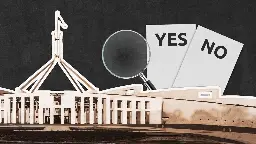We gave the Voice to Parliament pamphlets to fact checkers. Here's what they said
We gave the Voice to Parliament pamphlets to fact checkers. Here's what they said
www.sbs.com.au We gave the Voice to Parliament pamphlets to fact checkers. Here's what they said
We gave the Yes and No pamphlets for the Voice to fact-checkers. This is what they came back with.

Title: We gave the Voice to Parliament pamphlets to fact checkers. Here's what they said.
Key Points:
-
Background: The Yes and No pamphlets for the Voice to Parliament referendum are available. The AEC releases them without fact-checking.
-
Yes Pamphlet Claims and Fact-Checks:
- Claim: The Voice originates from Aboriginal and Torres Strait Islander people. FactCheck: Confirmed; it was proposed in the Uluru Statement from the Heart.
- Claim: The Voice will advise on key Aboriginal and Torres Strait Islander issues. FactCheck: True; it will make representations to Parliament on related matters.
- Claim: Governments didn't listen to ground-level voices. FactCheck: Needs specifics on which initiatives failed and why.
- Claim: Constitutional inclusion ensures the Voice's stability. FactCheck: True; it provides security and certainty.
- Claim: The Voice is constitutionally sound and lacks veto power. FactCheck: Confirmed; it won't have a veto power.
-
No Pamphlet Claims and Fact-Checks:
- Claim: The Voice might risk legal challenges. FactCheck: Incorrect; it can't make binding demands or veto legislation.
- Claim: The Voice is untested elsewhere. FactCheck: Other countries have similar First Nations consultation approaches.
- Claim: Many Aboriginal and Torres Strait Islander representative bodies already exist. FactCheck: The Voice differs in independence and representation.
- Claim: A centralized Voice might overlook regional needs. FactCheck: The design ensures focus on communities and regional representation.
0
comments